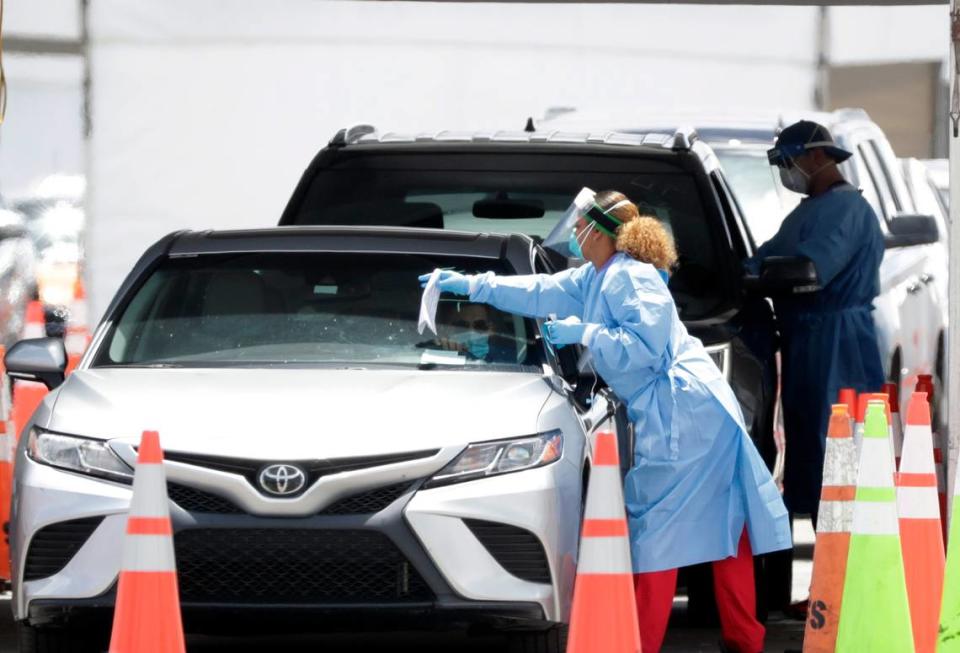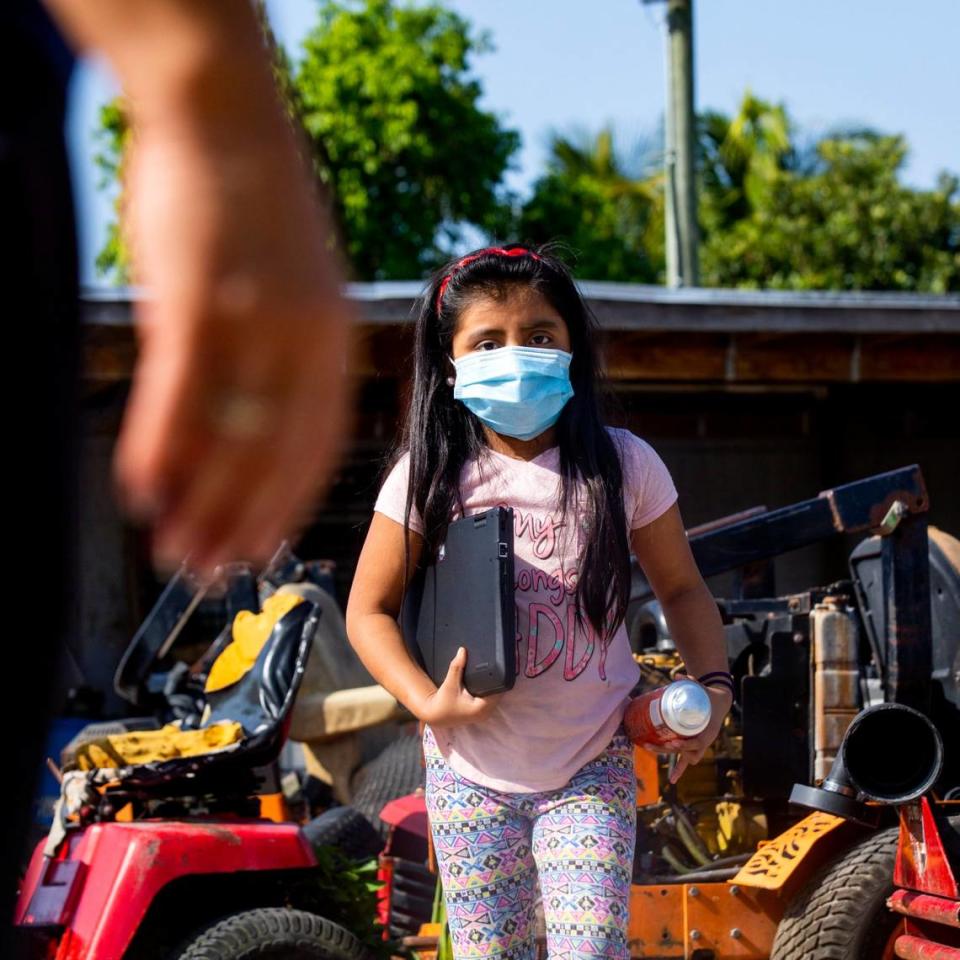Miami-Dade Schools will require mandatory masks when school begins
On the same day authorities took new steps to address the recent surge in Florida COVID-19 cases, Miami-Dade County Public Schools signed off on a plan Wednesday to reopen schools this fall, calling for smaller classes, a mix of in-person, online and hybrid teaching models and masks mandated for all.
The nine-member School Board unanimously approved the district’s reopening plan, which depends on the county transitioning to Phase 2 of the state’s reopening plan by Aug. 24, the first day of classes. Superintendent Alberto Carvalho characterized the plan as “nimble” and a “work in progress.” He said the district will prepare for a fully online fall if necessary, due to the rising COVID-19 cases.
Miami-Dade County reported 1,141 new cases of COVID-19 and nine new deaths on Wednesday, bringing the county’s total to 37,961 cases and 1,000 deaths, the highest in the state.
“We all hope that by the time schools are set to open that things have improved dramatically and that we are in Phase 3. In my opinion, that’s probably unlikely,” said Carvalho.
School leaders presented the plan during a special meeting Wednesday afternoon to the board, which deliberated for more than four hours and heard public comments for more than an hour before voting. The plan calls for face-to-face learning to restart with smaller class sizes, staggered arrival and dismissal times for students, social distancing and mandatory face coverings for everyone.
Previously, the plan had stopped short of requiring face coverings inside classrooms, instead labeling them as “optional” in classrooms.
“We have shifted away from that position based on more recent information available to us,“ Carvalho said. The district changed gears to heed the advice of Dr. Anthony Fauci, who testified Tuesday before a Senate panel, saying new coronavirus cases could more than double to 100,000 a day nationwide if steps aren’t taken to contain the virus.

Carvalho said the plan will be flexible and allow for different types of face coverings — masks, shields and other measures.
He said it’s “scientifically proven” that some students learn better if they’re able to see their teachers’ gestures and follow the movement of their lips, so the district is evaluating whether it can provide educators with PPE options that allow for that.
He also said the plan calls for the “brief lifting of coverings” while eating and practicing sports.
DeSantis says virus ‘doesn’t like sunshine, heat and humidity,’ enjoy July 4th outside
Other learning options
From July 6-10, parents will have the option to opt into that “Schoolhouse Model” and send their children to school, or join “My School Online,” which students would follow on the regular school schedule, instead of the flexible one allowed this past spring. Parents who choose to enroll their child online can switch to in-person learning for the spring semester.
If at least 25% of a school’s student population picks online learning, then the school can accommodate students whose parents choose to send them to school.
If less than 25% opt for online learning, parents will be further surveyed July 13-20 on which hybrid model they prefer. The district proposes two hybrid models of in-person and online learning, either attending school two days a week, or three days.
During the meeting’s public comments, some parents raised concerns about the hybrid models, asking the district to take Friday or another day to clean the facilities. Carvalho said the district is “contemplating” deep sanitation on nights and during weekends.

Parents can indicate their choice through the Parent Portal on the schools’ website, Dadeschools Mobile App or by contacting their child’s school.
On July 27, about a month before school starts on Aug. 24, the schools will notify parents how their child will be taught this fall.
Safety measures for in-person classes
The schools reopening plan asks for parents to take the temperatures of their children and for employees to take their own before school. Staff won’t take students’ temperatures at school entrances. Carvalho described himself as “an early proponent of that” measure, but said he’s since received “overwhelming” advice from health experts not to do it.
However, if students appear ill, school staffers will screen for symptoms and isolate the children, if needed. Each school will have two areas designated for staff members or students to quarantine. Ideally, school nurses would be in charge, but in schools that don’t have nurses, other staff members will step in.
“On a need basis, we will train individuals, as we have always done, who may not necessarily be health professionals, on the supervision of children or others who may exhibit symptoms,” he said.
The district will work with the state Department of Health for contact tracing.
But one person complained, arguing educators aren’t health professionals and questioned their ability to differentiate between the effects of a long night playing Fortnite and COVID symptoms. Others wondered how would schools prevent asymptomatic transmission.

The district will install plastic barriers “where appropriate” and implement one-way hallways. The plan mandates schools to increase cleaning during the school days; Carvalho said the district will allocate more resources to pay for additional cleaning supplies and pay for overtime work.
Schools will carry out extracurricular activities virtually when possible, and slowly relaunch those and athletic programs as phases advance. They will stagger lunch periods to minimize crowds in cafeteria lines and provide grab-and-go meals.
Some of the transportation safety measures include “recruiting” more drivers and modifying bus routes to reduce bus capacity, requiring face coverings inside the bus, labeling bus seating for social distancing and “encouraging” social distancing at pickup and drop-off. The district is also installing plastic barriers between drivers and riders, which Carvalho said he couldn’t guarantee would be all set up by August, but assured the board that they’re working on it. The bus driver or an aide, if there, will enforce the rules.
Carvalho said school authorities will amend codes of conduct to permit enforcement of the new rules, but ultimately he hopes parents and other community members will step in.
More than 7,000 kids have tested positive for coronavirus in Florida. 12 have MIS-C
“We have a lot of work to do in terms of sensitizing our parent community to help us educate children on the appropriate behavior and the following of instructions as provided,” Carvalho said. “I don’t think we can singularly rely on the monitoring and the supervision. Yes, that will be in place, but we need also the community’s assistance.”
El Nuevo Herald reporter Ana Claudia Chacín and Miami Herald education reporter Colleen Wright contributed to this story.

